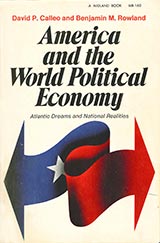As economic conflicts proliferate, Calleo and Rowland offer a comprehensive study of the roots, motivations, and impact of postwar America’s international economic policies. While admiring America’s role in creating an open world economy out of the wartime wreckage, they see the capitalist world now heading into economic and political difficulties, for which the United States bears a great part of the blame. American policy, bemused by a specious “internationalism,” seems dedicated to sustaining hegemonic relationships in what they see as an increasingly plural world. Such a posture imperils America’s domestic economy and causes increasingly intolerable disruption to economies abroad.
This book’s main parts analyze the origins of America’s current economic and geopolitical world view; then the impact upon Europe and the rest of the world of America’s “Atlanticist” policies toward trade, money, and international corporations. Further chapters weigh America’s political-economic policies toward Japan and the Third World. The conclusion considers the fundamental political rules for reorganizing the international economic system. A wealth of statistical and bibliographic material complements the broad historical, political, and economic analysis. The book won the American Political Science Association’s Gladys M. Kammerer award for the year’s best book in 1974.
‘David Calleo’s promise in his [earlier books] is more than fulfilled, and he has been joined in this book by an able collaborator, Benjamin Rowland… the reader will be happy in this book to meet these Americans.’
–Oswald Mosley, Books and Bookmen, December 1973
‘This is a masterful survey of the ideological, economic, and political concerns which have governed the unsuccessful US foreign trade policy in recent years. It is a very successful interdisciplinary study, with the kind of integration of economics, history, and political science which can only be achieved by skilled authors accepting responsibility for an entire work.’
– Alan J. Ward, Perspective, November 1973
‘Each of their chapters contains intelligent ideas and cogent remarks, or at least the adoption of other people’s correct interpretations. Their treatment of the American vision of the Atlantic Community is excellent, and their streamlined rendering of the monetary and trade arms of American “internationalism” is equally good. Unlike most Americans, and quite a few Europeans, they give a restrained account of General de Gaulle’s foreign policy, rather than switch into the mildly hysterical gear which seems de rigueur for Anglo-Saxons when dealing with the General.’
– Marcello de Cecco, International Affairs, January 1976
